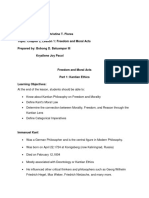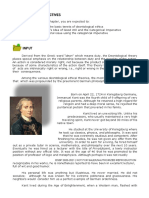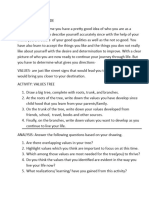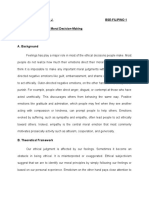100%(1)100% found this document useful (1 vote)
109 viewsChapter 5 Lesson 3 Religious Response
Chapter 5 Lesson 3 Religious Response
Uploaded by
tine84394This document discusses the relationship between ethics and religion. It aims to differentiate ethics from religion and explain religion's role in ethics. While ethics determines morality through reason, religion also seeks to answer fundamental questions of morality but draws from revelation and scripture. The document argues that religion supports ethics, not contradicting it, as both seek to determine what is good and moral. It notes that religious individuals also use reason to examine their views and interpretations.
Copyright:
© All Rights Reserved
Available Formats
Download as PPTX, PDF, TXT or read online from Scribd
Chapter 5 Lesson 3 Religious Response
Chapter 5 Lesson 3 Religious Response
Uploaded by
tine84394100%(1)100% found this document useful (1 vote)
109 views6 pagesThis document discusses the relationship between ethics and religion. It aims to differentiate ethics from religion and explain religion's role in ethics. While ethics determines morality through reason, religion also seeks to answer fundamental questions of morality but draws from revelation and scripture. The document argues that religion supports ethics, not contradicting it, as both seek to determine what is good and moral. It notes that religious individuals also use reason to examine their views and interpretations.
Copyright
© © All Rights Reserved
Available Formats
PPTX, PDF, TXT or read online from Scribd
Share this document
Did you find this document useful?
Is this content inappropriate?
This document discusses the relationship between ethics and religion. It aims to differentiate ethics from religion and explain religion's role in ethics. While ethics determines morality through reason, religion also seeks to answer fundamental questions of morality but draws from revelation and scripture. The document argues that religion supports ethics, not contradicting it, as both seek to determine what is good and moral. It notes that religious individuals also use reason to examine their views and interpretations.
Copyright:
© All Rights Reserved
Available Formats
Download as PPTX, PDF, TXT or read online from Scribd
Download as pptx, pdf, or txt
100%(1)100% found this document useful (1 vote)
109 views6 pagesChapter 5 Lesson 3 Religious Response
Chapter 5 Lesson 3 Religious Response
Uploaded by
tine84394This document discusses the relationship between ethics and religion. It aims to differentiate ethics from religion and explain religion's role in ethics. While ethics determines morality through reason, religion also seeks to answer fundamental questions of morality but draws from revelation and scripture. The document argues that religion supports ethics, not contradicting it, as both seek to determine what is good and moral. It notes that religious individuals also use reason to examine their views and interpretations.
Copyright:
© All Rights Reserved
Available Formats
Download as PPTX, PDF, TXT or read online from Scribd
Download as pptx, pdf, or txt
You are on page 1of 6
Lesson 3 Religious Response:
The Role of Religion in Ethics
Intended Learning Outcomes:
Differentiate ethics from Religion
Explain the role of Religion in Ethics
Introduction
Several articles uploaded on the
Internet state that ethics or morality is
possible without God. Even if one does not
believe in God, he can still be ethical. As to
how true these statements are, this is what
you should be able to see at the end of this
lesson
Ethics is concerned with what
is good and moral based on reason.
This is what religion is also
concerned about, what is moral
based on God’s revelation. So
religion is not contrary to ethics.
Religion is in support of Ethics.
Ethics and Religion
Both ethics and religion are
concerned with the most fundamental
questions human existence. Religion
draws answers to what is moral and
ethical from revelation as written in
Scriptures and as “lived by their
prophets and Jesus Christ (for
Christian).
Ethics gets its answers to what is moral and
ethical from reason and experience. It doesn’t mean
that theists don’t use reason when they determine
what is right and In fact, even those from whom
morality is religiously based may want to examine
their views based on reason. They may want to
examine various interpretations of their religious
principles for internal consistency or coherence.”
(MacKinnon,B., et al, 2015)
You might also like
- National Service Training Program (NSTP)Document47 pagesNational Service Training Program (NSTP)PanJan BalNo ratings yet
- Freedom As Foundation For Moral Acts (Kant's Philosophy of Freedom)Document17 pagesFreedom As Foundation For Moral Acts (Kant's Philosophy of Freedom)VENCHIE VIC FABREO100% (1)
- Reporting EthicsDocument17 pagesReporting EthicsJabe neyNo ratings yet
- Moral Issues and Concerns in Contemporary LivingDocument11 pagesMoral Issues and Concerns in Contemporary LivingChristian Dave TitularNo ratings yet
- GNED 02-Lesson 1-Key Concepts in EthicsDocument22 pagesGNED 02-Lesson 1-Key Concepts in EthicsMej TeañoNo ratings yet
- Meaning and Importance of HistoryDocument13 pagesMeaning and Importance of HistoryNix Racela100% (1)
- Freedom As Foundation For Moral ActsDocument18 pagesFreedom As Foundation For Moral ActsLeonel Dolendo100% (1)
- Ethics Semi-Final ExamDocument7 pagesEthics Semi-Final ExamJunriv RiveraNo ratings yet
- Filipino Cultural HeritageDocument24 pagesFilipino Cultural HeritageKhai La100% (1)
- Gethics Midterm PDFDocument6 pagesGethics Midterm PDFMark HerreroNo ratings yet
- Kohlberg's Stages of Moral DevelopmentDocument3 pagesKohlberg's Stages of Moral DevelopmentFlyff CancerNo ratings yet
- Moral DilemmasDocument29 pagesMoral DilemmasAbiekhay Camillee Unson LavastidaNo ratings yet
- Moral Standards vs. Non-Moral Standards: Jensen DG. MañebogDocument1 pageMoral Standards vs. Non-Moral Standards: Jensen DG. Mañebogal ray compuestoNo ratings yet
- Uts C-1-3Document8 pagesUts C-1-3Darioz Basanez LuceroNo ratings yet
- ETHICS SyllabusDocument4 pagesETHICS SyllabusJee-han Han100% (1)
- You Are A Teacher - Doc Version 1Document2 pagesYou Are A Teacher - Doc Version 1Maribel Yoson100% (1)
- Lesson 3 - Freedom As Foundation For Moral ActsDocument29 pagesLesson 3 - Freedom As Foundation For Moral ActsJude Lope100% (1)
- Freedom As Foundation For Moral ActsDocument21 pagesFreedom As Foundation For Moral ActsBarbie Bea Bacala100% (1)
- Anthropological PerspectiveDocument5 pagesAnthropological PerspectivePrincess CaranguianNo ratings yet
- The Importance of Physical EducationDocument3 pagesThe Importance of Physical EducationPraveen NarayanNo ratings yet
- Human ActsDocument18 pagesHuman ActsXael XaelNo ratings yet
- Foundations of Moral ValueDocument7 pagesFoundations of Moral ValueRAFAEL NOEL PANGGATNo ratings yet
- 3 One Past But Many Histories Controversies and Conflicting Views in Phil. HistoryDocument60 pages3 One Past But Many Histories Controversies and Conflicting Views in Phil. Historyancho.gernardjohann100% (1)
- CN 6147 Module - Freedom and Moral ActsDocument8 pagesCN 6147 Module - Freedom and Moral ActsBong D. Batuampar IIINo ratings yet
- BBC - Ethics - Introduction To Ethics - Ethics - A General IntroductionDocument8 pagesBBC - Ethics - Introduction To Ethics - Ethics - A General IntroductionPraveen VermaNo ratings yet
- Chapter 4 Duty-Based EthicsDocument9 pagesChapter 4 Duty-Based EthicsJanella TamagNo ratings yet
- Natural Law Ethics Presntation 1Document28 pagesNatural Law Ethics Presntation 1John King AmuraoNo ratings yet
- Moral Theories AND Mental Frames: Ms. Christine B. Garcia Mr. Christian Michael M. DavidDocument16 pagesMoral Theories AND Mental Frames: Ms. Christine B. Garcia Mr. Christian Michael M. DavidKimberly Santos Dela PenaNo ratings yet
- Lesson 5: Moral DevelopmentDocument14 pagesLesson 5: Moral DevelopmentManiya Dianne ReyesNo ratings yet
- Ethics Module 1Document13 pagesEthics Module 1Shean BucayNo ratings yet
- 1 Ethics Its Meaning Nature and ScopeDocument26 pages1 Ethics Its Meaning Nature and ScopeLynlee Bebs T. ClavicillasNo ratings yet
- Reason and ImpartialityDocument3 pagesReason and ImpartialityLaurice Morta PaduaNo ratings yet
- The Unexamined Life Essay by Michael GriffithsDocument4 pagesThe Unexamined Life Essay by Michael GriffithsambaguioNo ratings yet
- Ethics Chapter 3Document12 pagesEthics Chapter 3EVANGELISTA REYMUND V.No ratings yet
- Reviewer in Uts (Midterm Exam)Document10 pagesReviewer in Uts (Midterm Exam)Shane Margarette PalicpicNo ratings yet
- Moral VS Non-Moral StandardsDocument26 pagesMoral VS Non-Moral StandardsRr NgayaanNo ratings yet
- The Development of Moral Character of The Moral - EdnaDocument22 pagesThe Development of Moral Character of The Moral - EdnaBren GuzmanNo ratings yet
- The Moral Agent and The Development of Moral Character 3Document4 pagesThe Moral Agent and The Development of Moral Character 3Iven B. TañaraNo ratings yet
- Ethics Handouts 1Document4 pagesEthics Handouts 1Celeste De VeraNo ratings yet
- Module 2Document23 pagesModule 2Irine Grace PisayNo ratings yet
- Unit 3 - Ethics - Part 2 - The Human ActDocument23 pagesUnit 3 - Ethics - Part 2 - The Human ActErica Caturay100% (1)
- Fundamentals of Research (Assignment No. 1)Document9 pagesFundamentals of Research (Assignment No. 1)Paul DayangNo ratings yet
- Ethics Study Guide For Module 2 ISO 09052020Document8 pagesEthics Study Guide For Module 2 ISO 09052020Tanya Alyssa Untalan AquinoNo ratings yet
- Ethics - Moral Relativism (With A Focus On Moral Conventionalism) PDFDocument8 pagesEthics - Moral Relativism (With A Focus On Moral Conventionalism) PDFmaryaniNo ratings yet
- The Ethical Dimension of Human Existence 0Document18 pagesThe Ethical Dimension of Human Existence 0Joy DulsaNo ratings yet
- Freedom As Foundation For Moral ActsDocument40 pagesFreedom As Foundation For Moral ActsRonnJosephdelRio100% (1)
- Kohlbergs Theory of Moral DevelopmentDocument42 pagesKohlbergs Theory of Moral DevelopmentMary Grace Magadia PilarNo ratings yet
- 5th Reason, Impartiality, and Moral Courage M3L2Document5 pages5th Reason, Impartiality, and Moral Courage M3L2JamNo ratings yet
- 2 - Dilemma and Foundation of MoralityDocument11 pages2 - Dilemma and Foundation of Moralityvertine belerNo ratings yet
- Learning To Be A Better LearnerDocument7 pagesLearning To Be A Better LearnerJhan Rhoan SalazarNo ratings yet
- Good Manners and Right Conduct 2Document7 pagesGood Manners and Right Conduct 2Edhielyn GabrielNo ratings yet
- LESSON 3 - Freedom As Foundation For Moral Acts Ethics and CultureDocument21 pagesLESSON 3 - Freedom As Foundation For Moral Acts Ethics and CultureJoesa Mae Chan BPA100% (1)
- Ethics-Midterm-Lesson 3 Essence and Varieties of LawDocument10 pagesEthics-Midterm-Lesson 3 Essence and Varieties of LawRubiconCrosserNo ratings yet
- Chapter 1 EthicsDocument13 pagesChapter 1 EthicsReYna JaNeNo ratings yet
- Chapter 2 Lesson 3 Managing The Material SelfDocument37 pagesChapter 2 Lesson 3 Managing The Material Selfkerlaila.delacruz.cvtNo ratings yet
- The Moral AgentDocument20 pagesThe Moral AgentSahren Al Marzouqi100% (1)
- Mariano, Znyx Aleli J. Bse-Filipino 1 Module 9: Feelings and Moral Decision-Making A. BackgroundDocument5 pagesMariano, Znyx Aleli J. Bse-Filipino 1 Module 9: Feelings and Moral Decision-Making A. BackgroundZnyx Aleli Jazmin-MarianoNo ratings yet
- 2.2 Reason and Impartiality As Minimum Requirement For MoralityDocument5 pages2.2 Reason and Impartiality As Minimum Requirement For MoralityMarifer CavintaNo ratings yet
- A Brief History of Badminton from 1870 to 1949From EverandA Brief History of Badminton from 1870 to 1949Rating: 3.5 out of 5 stars3.5/5 (2)
- Chapter 4 Lesson 2 Aristotle Virtue EthicsDocument29 pagesChapter 4 Lesson 2 Aristotle Virtue Ethicstine84394No ratings yet
- Chapter 4 Lesson 1Document9 pagesChapter 4 Lesson 1tine84394No ratings yet
- Chapter 5 Lesson 1 Globalization and Its Critical Challenges inDocument23 pagesChapter 5 Lesson 1 Globalization and Its Critical Challenges intine84394100% (1)
- Chapter 4 Lesson 6 Presentation in EthicsDocument13 pagesChapter 4 Lesson 6 Presentation in Ethicstine84394No ratings yet
- Muscle Produce MovementDocument10 pagesMuscle Produce Movementtine84394No ratings yet
- Factors Influencing Bone HealthDocument4 pagesFactors Influencing Bone Healthtine84394No ratings yet
- Human Movement and MuscleDocument2 pagesHuman Movement and Muscletine84394No ratings yet


































































